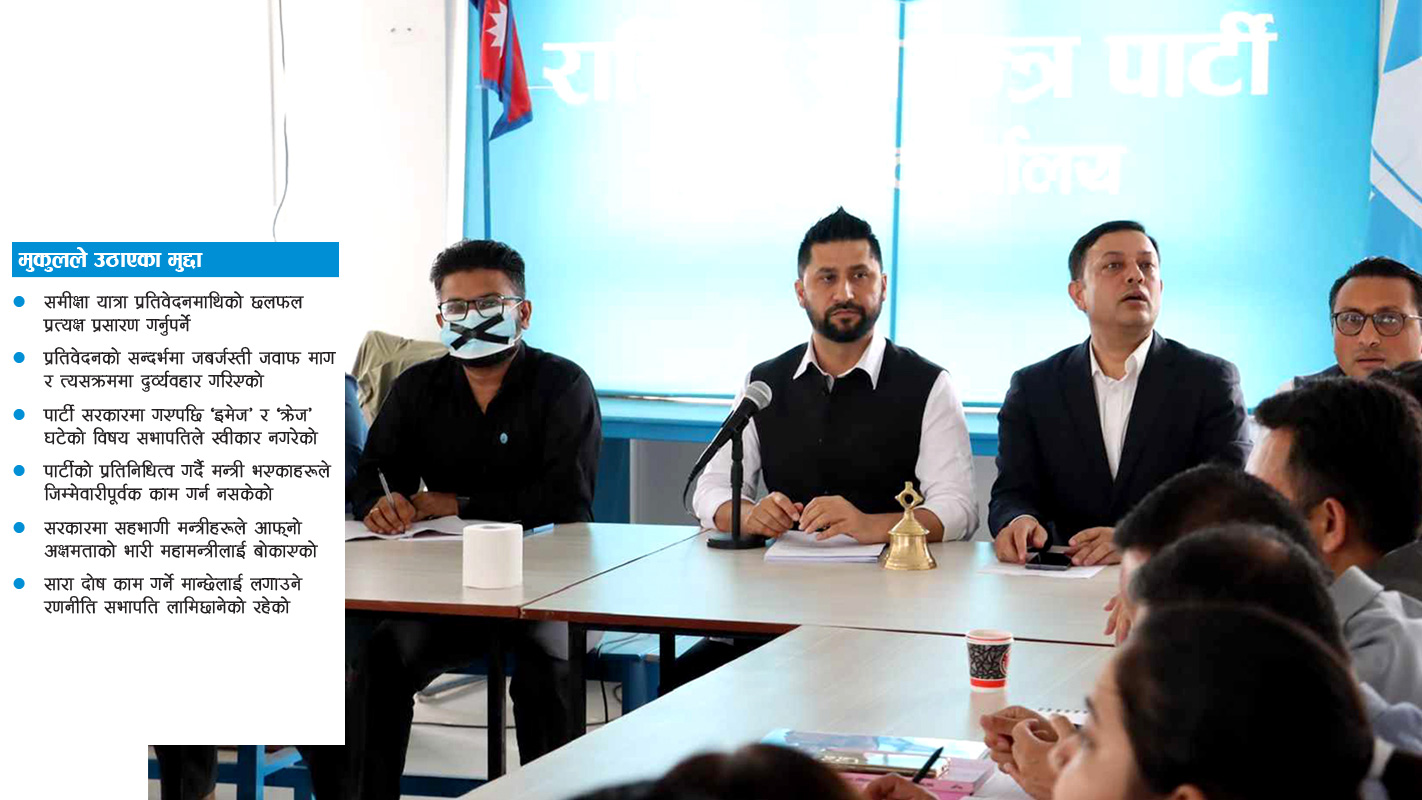The Kumbh Mela of the Communist 'detachment'
We use Google Cloud Translation Services. Google requires we provide the following disclaimer relating to use of this service:
This service may contain translations powered by Google. Google disclaims all warranties related to the translations, expressed or implied, including any warranties of accuracy, reliability, and any implied warranties of merchantability, fitness for a particular purpose, and noninfringement.


Conventions of political parties are no longer a matter of interest to the general public. Even though the ranks of the leaders/activists of the related parties are rippled by such projects, they do not touch the common man at all. Congresses, which are limited to fulfilling the ambitions of certain individuals, have ceased to be a matter of attraction.



The same is the fate of the CPN United Samajwadi Party (S) Congress, which started yesterday and Sunday. The convention of this party, which was elected three years ago from the CPN-UML, but has not been able to achieve the status of a national party, is like saying 'Kaglai bel pakyo harsh na wismat' to the common people. There is no expectation, no interest in this. Although there is no interest among the common people, there is a taste towards this convention in the political circle. The increased power in the small party is not only due to the game of struggle, but also after General Secretary Ghanshyam Bhusal has moved to replace President Madhav Kumar Nepal, there is interest in who will be the next original leader.
Ace has three aspirants for leadership. The president wants to be renewed as a leader, claiming that he created the party by rebelling from Nepal UML. "Respected Leader" Jhalnath Khanal is saying that "the leader should be the one who has the policy" as his political/ideological view is his own. He seems to be in the strategy of making a consensus in his favor and if not, supporting Bhusal as his ideological successor. Bhusal, on the other hand, is looking for a way to reach the leadership by persuading both the top leaders by advancing the slogan of political reorganization and generational change.
Looking at the scenario leading up to the opening session of the convention, the leadership of S will fall on the shoulders of one of the three if there is consensus as the leaders said in their speech. If the leadership is selected through the election, it is certain that one of Nepal or Bhusal will reach the leadership. If the leadership is selected through a legitimate competition between these leaders of the top and second generation, it will be the 'fragrance of gold'. When the internal democracy in the parties is weakening, it will become a positive example in the promotion of the law and democratic values when the leadership is selected through elections. However, this alone will not establish the legitimacy of this party. CPN-S is in the crosshairs of the question while the congress is becoming an arena of competition to become the leader. On the occasion of the convention, more debate and discussion on this party target question has become relevant.
Two questions are important for this party at this time:
First, has CPN S been able to prove its justification and necessity in Nepali politics? The party needs to conduct a thorough review of this question in the ongoing congress. The bitter reality is that in the current political scenario, whether or not this party exists does not matter much. It certainly has a large role in the arithmetic of power politics. Its role can be seen in the state government reshuffling, power bargaining. But, has it been able to fulfill the existing terrible vacancy in Nepali politics?
At the level where the political value is declining, distrust towards the party and the leader is rising, can this party restore the lost trust and confidence of the people towards politics? The President continues to say that Nepal has played a role in saving the country from regression. He also claims that he is reorganizing the communist movement by rebelling from the UML. This is the main issue in his congress, the approval of the rebellion. But, was the formation of S. a rebellion? Or was it a compulsion for him? To understand the formation of
S, the background of the recent past should be explored. Nepali communists gained dominance in the first general election held in 2074 after the constitution was made in 2072. A powerful party and a strong government could be built, but one leader cannot be blamed for its disintegration. In measuring the amount of its guilt, the role of the individual can be complicated. There is no doubt that the arrogant and arrogant working style of the then first chairman of the CPN and now the UML chairman KP Sharma Oli is one of the main reasons for the idolatry of the communists. However, other leaders involved in the sharing of power and power were not less responsible.
Nepal is also not free from questions. Said to be a coordinator and experienced, could he play such a role when factions and power struggles were raging within the party? Affected by the pain of innocent and marginal witnesses, Nepal played a role in increasing the growing conflict and power struggle between Oli and Prachanda. Oli, who felt under siege within the party, then set out to cause an accident. After Oli dissolved the parliament by breaking the law, Nepal stood in the front against it. However, the creation of that situation was the result of power struggle, ego and unnecessary power struggle of Oli, Prachanda and Nepal etc. Even today, this leader is hurt by the same tendency.
Nepal has accused UML of right-wing opportunism, but is it itself free from power opportunism? His desire for power, revealed a few weeks ago, is the latest example to confirm this. As soon as he joined the coalition, the 'boomerang' when he exercised the Prime Ministership under the guise of visible/invisible power, probably has not been forgotten by the S leadership. There is no difference between S and UML in terms of political character and tendencies.
Although the name is S, this party is 'Bhai UML'. S was born out of jealousy, malice and discord in the UML fraternity. Group practices, political/ideological debates, leaders' actions and tendencies are all the same. Let's look at the behavior and style of Nepal and Oli. Oli is honest. He looks proud and arrogant. He will also reveal. Nepal looks dignified but there is no less pride in them. When he was the general secretary of UML for a decade and a half, those who feel his pain within the party say that arrogance and autocracy are hidden in the dignity of Nepal. Especially in power practice, Oli and Nepal's 'schooling' is the same.
Nepal's contradictions and innocence are often reflected. Like: He claims to have rebelled against Oli's tendencies and himself comes to collaborate with the right-wing opportunist power. When Prachanda shrugs off the government, he does not see the need to take advice and suggestions from him. Be it towards Deuba or towards Oli, he is bound to follow Prachanda. His 'rebellion' comment seems even weaker at that time, when even the UML ranks, angry with Oli, are not ready to support him with confidence. Where is that row with Nepal now, who was able to exercise a parallel committee against Oli when he was in the UML?
Many people do not speak with their mouths, but in their hearts, Oli's behavior and work style do not satisfy them. However, they bow before Oli. Nepal's 'insurgency' does not appeal to him. They think a hundred times to join the rebellion of Nepal, who do not get 'space' even after offering Tvamsharanam to Oli. An example is Bhim Rawal himself. Even Rawal, who was sidelined by Oli's pelai, has not found a basis to be confident about Nepal's rebellion. The other big UML row is standing there, except for Oli. To attract him, it seems that even those who are organized now are looking for a way to return to UML.
In essence, the approbation of Nepal's insurgency happens when a large part of the UML ranks is attracted to his politics, organized. Therefore, the convention should be able to find a way to justify the political needs and justifications of this party, not the endorsement of rebellion. After Oli made it impossible for his opposition group to stay in the party with the strength of the majority, a small part under the leadership of Nepal formed S.
S had ample opportunity to embrace different political thinking, behavior and working style from UML. However, the people did not show any interest towards this party because they showed the same tendency, the same desire for power, the same opportunistic character. The election results are proof of that. S should be able to do his 'branding' by thoroughly reviewing these aspects. Especially in the market economy, what is the selling point of any product while 'branding' it? is sought The convention of this fledgling party in the political market should be able to find its 'selling point'.
Second question, what is the political destination of CPN S? Is the problem of this party only renewal or change of leadership? Whether Nepal or Bhusal is elected, will the confused political future of the party get a clear direction?
Many people think that this party will not exist until the 2084 elections. That the mother party returns to the UML or moves forward by blocking or uniting with the Maoists. Nepal is also one of the activists to build a socialist center. Nepal is a silent spectator when Prachanda is making the aim of establishing a socialist center a tool of power bargaining. However, in the documents presented for discussion at the Congress, S.L. has covered itself with the slogans of reorganizing the communist movement, scientific socialism, etc. Who will implement those catchy slogans?
What is the next path: merger with UML or unity/frontline with Maoists? Or if you want to build a different political existence, what are the plans and strategies? The Congress should be able to elect a political guide who can determine the political destination. As communist parties die, can Bhusal become such a guide in search of a solution to its life? Or Nepal that carries the comment of rebelling against Oli? Or the classical lecturer of communist politics Khanal?
Unquestionably, among these three characters, the untested Bhusal is the best. However, he should also be able to free himself from the tendency of the top leadership to differentiate between speech and action. He should also be clear, to compete to reach the leadership or persuasion. Bhusal prefers to discuss politics, writes sweet political essays. They explain and 'lobby' advanced socialism. Now, he claims, under his leadership, S will become a better party than the UML of yesterday. As the issue of political discussion in the convention is less, leadership selection and leader management is becoming more important, will he be able to create an idealistic political theater as he thought?
The party has come to the conclusion that a jumbo should be formed for positional management when it comes to the convention of establishing a precedent by forming a small and agile central committee. On one hand, Bhusal is calling for internal democracy, while on the other hand, he is persuading consensus by visiting the top leaders' doors and chambers. Isn't his stake in leadership with an active parent (which can also be called a high command in political language) a result of weak confidence? Isn't it inspired by the aspiration and opportunism that we will reach the leadership even once?
These and similar questions may also arise on him. However, he gets the 'benefit of the doubt' more than others. Bhusal, who has spent almost three and a half decades in communist politics, deserves at least an opportunity to be tested. Why do parties die? He knows that more than anyone else. Because, he tries to find a way to revive the parties by searching for the reasons for their demise. However, to know why the party dies, you don't need to think long and hard.
A political scientist has said - 'Political parties die by swallowing their own lies.' One thing on the cover and another in practice, i.e. lies, dishonesty, opacity, unhealthy games of factions make parties irrelevant. This formula should not be forgotten by the leaders/activists of Bhusal and S. And, without limiting the conference to Sanatani Kumbh, we can make it a platform for meaningful debate and practice.
 प्रकाशित : असार १७, २०८१ ०७:३०
प्रकाशित : असार १७, २०८१ ०७:३०

 २५.१२°C काठमाडौं
२५.१२°C काठमाडौं


















